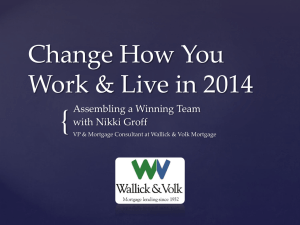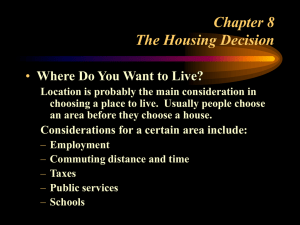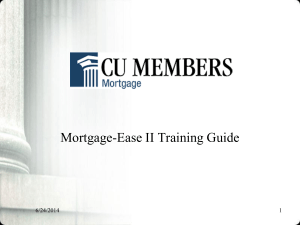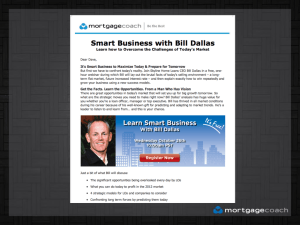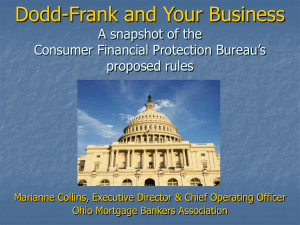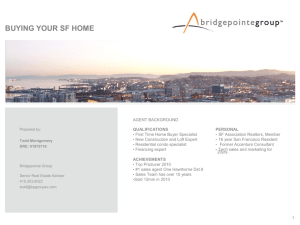Down Payment - Lancaster Central School District
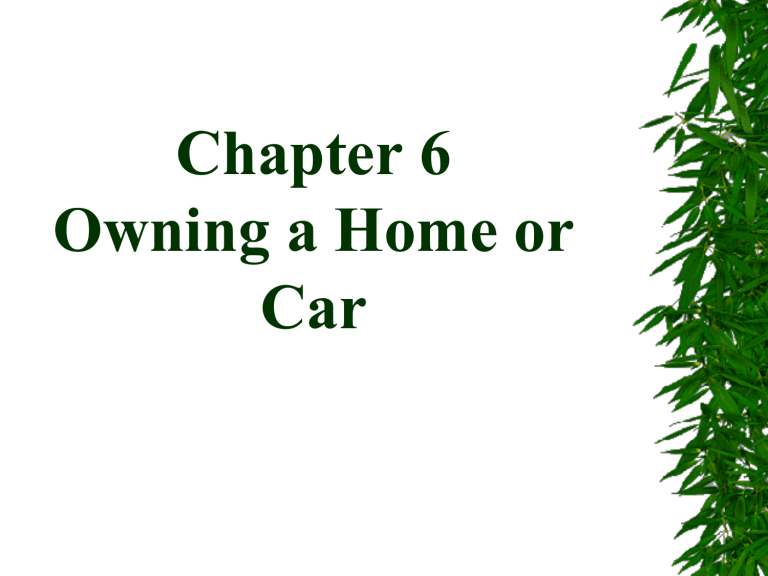
Chapter 6
Owning a Home or
Car
Chapter 6
(
Owning a Home)
6-1 Home buying (usually)requires:
Down payment – usually a given % amount of cash….this shows the bank you really want this house and are willing to pay for it.
(Usually represented as a %)
The balance of the purchase price
(after the down payment) is usually borrowed through a mortgage loan taken with a bank or other lender.
To calculate loan amount :
Purchase Price
Down Payment
Mortgage Loan/Borrowed Amt
To calculate loan amount:
Purchase Price
Down Payment
Mortgage Loan/Borrowed Amt
Ex: House costs $60,000, bank requires
10% down, what is the loan amount?
Purchase Price = $60,000
Down payment = - $6,000
($60,000 * 10%)
Loan Amount = $54,000
Example
Dorris wants to purchase a mobile home for $56,000. Her bank requires a 15% down payment. What amount of money does she have to have for a down payment AND how much will her loan amount be for?
$8,400.00 AND $47,600
When you finish the last page of a book, what do you usually do?
The actual transaction to purchase a house is called a
Closing…however…
There are other costs involved than just paying the down payment and getting the loan for the balance.
These are called closing costs.
Please look at the situational questions in your folders on your tables.
Situational Cards:
Who will ensure the contract is correct?
Legal Fees
Who/what will ensure your property is exactly
2 acres?
Property survey
Who/what will ensure a long lost relative won’t claim the house is theirs?
Title Insurance
Who/what will guarantee the cellar walls won’t leak?
Inspection Fees
Who/what will charge to “put your paperwork” through and/or keep a record of your transaction?
Recording/Processing Fees
Still need closing costs defined better?
Closing Costs & Title Videos: http://youtu.be/UgFQtmAHsbw
(4:08)
Closing Costs : these are fees and
expenses paid to complete the transfer of ownership of a home.
Closing costs range from 3% to 6% of the purchase price of the home and include:
Closing costs can be legal fees listed individually OR title insurance it can be estimated as appraisal fees a percentage.
inspection fees
land surveys, …etc.
Where do closing costs come in?
When you need to calculate how much cash you must bring with you to the “closing”
To calculate cash needed to buy a home:
Down Payment
At this “closing” is when you sign the bank papers for the
+ Closing Costs loan.
Cash Needed to Buy a Home
Look try these examples:
Hilda is buying a home for $74,000. She will make a 20% down payment and estimates closing costs as:
1. What amount of money will she need to borrow for her mortgage loan?
$74,000 * .20= $14,800
$74,000-$14,800 =
$59,200
Look try these examples:
Hilda is buying a home for $74,000. She will make a 20% down payment and estimates closing costs as:
Legal fees
Title insurance
Property survey
$950
$140
$250
Inspection $175
Loan processing fee $ 84
Recording fee $740
1. What amount of cash will she need when she buys the house?
$14,800 (down payment) +
$2,339 (closing costs) =
$17,139.00
Ricky Alberts’ lender requires him to make a 25% down payment to get a mortgage on a home that costs
$86,000. What amount will Ricky have to borrow to purchase the home?
$86,000 *.25 = $21,500 – down payment
$86,000 - $21,500 = $64,500 Loan Amount
If closing costs are 4% of the purchase price what is the total closing costs?
$86,000 *.04 = $3,440 = closing costs
How much money does Rick need to bring to close the transaction?
$24,940 ($21,500 + $3,440)
Terri Wilburn will be able to purchase a condominium by making a 5% down payment on its $64,000 purchase price. She estimates her closing costs to be 3.5% of the purchase price. What amount of money will Terri need to pay the down payment and closing costs?
$64,000 * 5% = $3,200
$64,000 * 3.5% = $2,240
$6,425 + $2,240 = $5,440
Why do you think a bank would required a larger % for down payment OR a higher interest rate?
Looking at the closing costs, what would make a closing costs increase?
Workbook…page 71
#1-4
Can you explain??
How do you calculate a loan amount with a down payment?
What kind of items are included in closing costs?
How do you calculate how much cash you need to bring with you to “close” on a house.
Mortgage Rates:
1. Fixed Rate Mortgage – your interest rate stays the same over the time period of the loan.
2. Variable/Adjustable Rate Mortgages
– interest rates can change during the time period of the loan.
**
Usually the initial interest rate is lower than fixed, however, the lender is allowed to increase or decrease the rate at specified intervals.
Amortization Tables
Most mortgages are repaid gradually, or amortized, over the life of the mortgage in equal monthly payments.
Each payment pays off part of the principal plus the interest due each month.
Look at the top of page 211..note how little principal is paid in the first few months compared to the last few.
Examples
Using the table on page 211, what is my monthly payment for a $45,000 mortgage taken out for 30 years at
6% interest?
$ 269.80…how many times(months) did you make this payment?
12 * 30 = 360
How much did you pay for this
$45,000 loan at the end of the term?
269.80 * 360 = $97,128.00
Examples..Page 212
C and D…
C.
D.
E.
$620.24; $68,857.60
$257.72; $37,316
Refinancing a Mortgage – when you take out a new mortgage and use that money to pay off the old mortgage. You must also pay new closing costs that are incurred.
Look at page 213 Example
E.
$748
F.
$71
Homework:
Page 71-72 - all questions
(this will be graded on Monday)
6-2 Renting or Owning a
Home
Cost of Ownership…Owning a home comes with expenses:
Property taxes
Repairs
Maintenance
Utilities
Insurance
Trash pick up…etc
Two less obvious expenses:
1.
2.
Depreciation
Loss of Income on the money invested in the home.
Depreciation
1.
The loss of value of property caused by aging and use….ex: roof, heating costs, not updating
Most housing depreciates slowly at about 1% to 4% of its original value per year.
Amount of depreciation can’t be calculated until a house is sold
Loss of Income on the money invested in the home.
1.
Occurs because the money initially invested in buying the property (down payment and closing costs) could have been deposited in a savings account and earned interest.
Then why own? …people can include the interest they pay on their home mortgage and property taxes they pay on their tax return….this reduces taxable income…you pay less taxes and have equity in a house.
Equity
The difference between what is owed on a home and its value.
$5,244
$2,350
$360
$1,240
$1,710
$1,535
$1,270
Look at page 217
Example 1 mortgage interest property taxes
Insurance depreciation utilities maintenance, repairs loss interest
$13,709 total expenses
$1,428 tax reductions
$12,281 net cost for the first year
Look at page 218
Example 1
A.
B.
C.
$16,572.00
$12,629.00
Now do page 71 in your workbook.
Costs of Property Rental
Some people can’t afford to buy or don’t want the hassle of maintenance…so they rent
Renters:
1.
2.
Usually pay a one time security deposit in addition to their first month’s rent…this covers any damage done while living there…if there is no damage, the money is returned.
Sign a lease or rental agreement that they will be there for a stated period of time.
Look at page 218
Letters C and D
A.
B.
C.
$16,572.00
$12,629.00
Now do page 71 in your workbook.
Homework:
Page 73 in your workbook
Compare Renting and
Owning Homes
When you rent, you consider the monthly rent as an expense, however when you pay your mortgage, that is not considered an expense, but the interest, utilities and everything else is.
6-3 Property Taxes
Property taxes – taxes on the value of real estate such as homes, business property, or farm land.
Usually collected annually or semiannually by the tax department of the town or city you live in.
Services paid for by taxes:
Schools
Government operations
Fire protection
Police protection
Parks
Road maintenance
What does the word assessed mean?
Taxes are paid based on the assessed value…
An assessed value is usually calculated by local tax assessors and is usually a percentage of the actual value of your house…
Ex:Bill Watson’s home is valued at
$150,000.00. It is assessed at 40% of its market value or $60,000.00.
Taxes are then calculated on the assessed value of $60,000.00
Local tax districts determine the tax rate needed to pay for the services they provide.
They estimate their expenses for the coming year and prepare an expense budget. They also estimate income from sources other than property tax, such as licenses, fee, fines, rents, state aid and so on.
The difference between the total budget and the income from other sources is the amount that must be raised by the property tax.
Local tax districts then determine the decimal tax rate, which is the tax rate at which property is to be taxed.
Decimal tax rate = amount to be raised by property tax
Total assessed value
Example 1 from page 224:
$6,000,000 - $1,800,000 = $4,200,000 (property tax needed)
$39,999,000
= .107692
Tax rates per $100 or
$1,000
To find the tax due on property when the rate is in $100 or $1,000, first find the number of $100 units or $1,000 units in the assessed value. Then , multiply the numbers of units by the tax rate to find the tax due.
Read Example 2 on page 225
Look at page 225
Example 1
C.
D.
F.
$1,569.12
$4,953.60
Page 226
E.
$3,380.40
$348.71
Homework:
Page 75 &76 in your workbook – due Tuesday
6-3 Property Insurance
Homeowners insurance – covers your home and protects you against other risks.
Dwelling – the home in which you live
Other structures – garage
Personal property – contents of home
Additional living expense – pays for the extra cost when you can live at home
Personal liability – protects you against lawsuits by person injured on your property
Medical payments to others
Replacement costs policies – pays to replace at current value
Premiums – the money paid to an insurance company…this is your bill.
Renters Insurance – same coverage as a home, but if you rent.
Deductible – the amount you pay before your insurance company pays.
Homework…
Page 77-78 #1-9
6-5 Buying a Car
MSRP – Manufacturer’s Suggested
Retail Price….also known as sticker price
Car buyers usually do not pay this price…they negotiate a price to pay based on trade in, rebates, and loan options.
Words to know…
Purchase Price – refers to the price negotiated by the dealer and the buyer. This price includes the car and any options installed by the dealer
Delivered Price
– also called “out the door” price…this includes purchase price, sales tax, registration fees less the rebate.
Balance Due
– what the customer has to pay for their car….less discounts, rebates, down payments or trade-ins..
Base price – price for a model with just the standard features.
Warranty – this comes on all new cars and usually covers things that break 36 months or 36,000 miles…this doesn’t include maintenance.
Extended warranty – provides extra coverage for a number of months and mile
Purchase Price
Rebates
Sales Tax
Delivered Price
Registration Fees
Down Payment
Non-taxable items
Balance Due
Look at page 241
Letters C and D
C.
D.
E.
$21,354.87 $15,354.87
$17,398.28 $15,774.48
workbook.
6-6 Car Purchases and
Leases
The delivered price of a car purchase may be paid in cash, however, most people make a down payment and take out installment loans.
6-6 Car Purchases and
Leases
The delivered price of Sue’s car is $23,560.
She makes a $2,000 down payment and pays the balance in 48 monthly payments of
$560. What total amount did Sue pay for the car, AND what was the finance charge?
1. $2,000 + $26,880 (560 x 48) =
$28,880..paid for
2. $28,880 - $23,560 = $5,320…finance charge
Let’s Solve…
Steve Rubin bought a used truck for
$9,650. He paid for the truck with a
$2,650 down payment and 36 monthly payments of $234.30.
What total amount did the truck cost?
$11,084.80
Let’s Solve…
Angie bought a luxury car for $47,851 and made a $4,500 down payment.
She got a special loan rate of 2.1% for 60 months. Her monthly payments were $761.74. What was her finance charge on this car?
$2,353.40
Cost of Leasing
A lease is a contract between the car company and the customer. Similar to renting a car for a long period of time.
Conditions:
Return in good condition
Usually within a stated # of miles
Payment and time frame is agreed to
Required down payment
You must still pay for registration and processing fees.
You usually have the option of buying the car at the end of the lease period. (Residual
Value)
Compare Leasing and
Buying
When comparing the two, you must add the residual value to the cost of leasing since you assume you will buy at the end.
Wilbur and his dealer negotiated a price of $27,400 for a new car. He can lease the car for $496 for 36 months and buy it at the end of the lease for its residual value of $16,200. If he buys the car now his month loan payment will be $822 for three years after making a $2,000 down payment . What is the total cost of purchasing the car under each plan?
Which is less expensive?
Lease: 36 x $496 = $17,856
$17,856 + $16,200 = $34,056..cost of leasing
Buy: 36 x $822 = $29,592
$29,592 + $2,000 = $31,592…cost of buying
Difference ….34,056 – 31,592 = 2,464
****Buying is less expensive!!!!
Homework
Workbook Page 81
6-7 Depreciating a Car
A car loses value as it grows older…the loss of value is called deprecation.
The total depreciation on a car is the difference between its original cost and its resale, or trade-in value.
Depreciation = Original Cost – Trade-in or Resale Value
6-7 Depreciating a Car
When you buy a car, you can only estimate what the depreciation will be.
The actual amount of depreciation will be known only when the car is sold or traded in.
6-8 Cost of Owning a Car
Car Insurance:
There are 4 basic types of insurance or coverage for motor vehicles that protect you against the risk of financial loss:
1.
2.
3.
4.
6-8 Cost of Owning a Car
Bodily Injury – covers your liability for injury to others.
Property damage – covers damage to other people’s property including their vehicles.
Collision – covers damage to your own motor vehicle.
Comprehensive damage – covers damage or loss to your vehicle from fire, theft, vandalism, hail, and other causes.
6-8 Cost of Owning a Car
Read page 256 in your textbook
Page 257…
A.
$664.85
B.
$1,064.50
C.
Costs of Operating Cars…
The total operating cost for a car is the sum of all the annual expenses of using the car.
These expenses include:
•Insurance •Repairs
•Gas •Garage rent
•Oil
•License
•Inspection fees
•Tires
•Parking fees
•Taxes
•Depreciation
•Interest lost on down payment
C.
D.
E.
6-8 Costs of Operating a
Car
$4,705.00
Page 257…
$ 2,158.00
Workbook Page 83 and 84
Please get this out….
Page 83 Answers…
Page 84 answers…
2.
3.
a.
$1,006.97 b.
$907.18
4.
a.
$1,422.90 b.
$1,160.56
c.
$262.34 saved a.
$1,032.32
b.
$154.85
c.
$877.47
Page 84 answers…
5.
a.
$786.46 regular annual premium b.
$1,415.63 premium Blanche must pay
6.
$3,176.36
Task…you now have the option of a vote for the test on Chapter 6…
Test Options:
1. Open textbook test to be done by yourselves.
2. Review work done with a partner, followed by an in class test.
Test Options:
Open textbook test to be done by yourselves.
Review work done with a partner, followed by an in class test.
After finding your partner, the two of you are to work on the following problems:
Page 261:
1-12
Page 262:
15, 17,19, 21, 27, 29, 31, 36-38
(you must SHOW work for ALL odd numbers)
Open your textbook to the following pages and do the following problems:
Test Questions..
Page 261:
1-12
Page 262:
14, 16, 18, 21, 27, 28, 30, 36, 38
(you must SHOW work for ALL odd numbers)
1.
2.
3.
4.
5.
6.
7.
8.
9.
10.
Page 261 Vocabulary Answers:
Premium
Lease
Bodily injury
Closing costs
Depreciation
Assessed value
Renters policy
Collision
Security deposit
Property taxes
Page 261 and 262 Answers:
11.
$89,845.00 / $18,280
12.
$255,434.40
13.
14.
15.
$21,442
16.
17.
0.00074
18.
Questions: 11, 12, 15, 17,19
19.
$18,721.80
21.
22.
23.
24.
25.
26.
$728
Page 261 and 262 Answers:
Questions:
36-38
21, 27, 29, 31,
27.
28.
$32 , 553.72 / $25,053.72
29.
30.
$9,368.64 / $1,241.64
31.
36.
37.
38.
Buying is $2,410 less expensive
$892.63
$3,176
$832.75
Good Luck !!!
1.
2.
3.
4.
5.
6.
7.
8.
9.
10.
Page 261 Vocab Test Answers
Premium
Lease
Bodily injury
Closing costs
Depreciation
Assessed value
Renters policy
Collision
Security deposit
Property taxes
Page 261 and 262 Test Answers
11.
$89,845.00 / $18,280
12.
$255,434.40
14.
$12,677
15.
16.
Buying is $4,860 less
17.
20.
18.
19.
$8,883.00
Questions: 11, 12,14, 16, 18, 21
21.
$728
Page 261 and 262 Test Answers:
27.
$ 32,553.72 / $25,053.72
28.
$6,655.10 / $0
29.
30.
$31,460.00
31.
32.
33.
34.
35.
36.
$892.63
37.
Questions: 27, 28, 30, 36, 38
38.
$832.75


